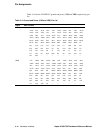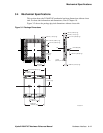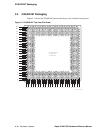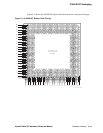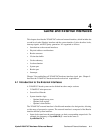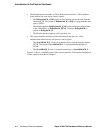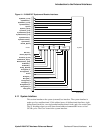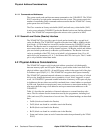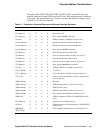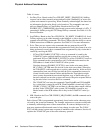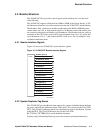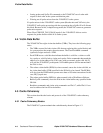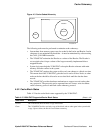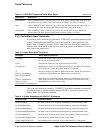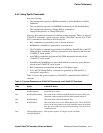4–4 Cache and External Interfaces
Alpha 21264/EV67 Hardware Reference Manual
Physical Address Considerations
4.1.1.1 Commands and Addresses
The system sends probe and data movement commands to the 21264/EV67. The 21264/
EV67 can hold up to eight probe commands from the system. The system controls the
number of outstanding probe commands and must ensure that the 21264/EV67 8-entry
probe queue does not overflow.
The Cbox contains an 8-entry miss buffer (MAF) and an 8-entry victim buffer (VAF).
A miss occurs when the 21264/EV67 probes the Bcache but does not find the addressed
block. The 21264/EV67 can queue eight cache misses to the system in its MAF.
4.1.2 Second-Level Cache (Bcache) Interface
The 21264/EV67 Cbox provides control signals and an interface for a second-level
cache, the Bcache. The 21264/EV67 supports a Bcache from 1MB to 16MB, with 64-
byte blocks. A 128-bit data bus is used for transfers between the 21264/EV67 and the
Bcache. The Bcache must be comprised of synchronous static RAMs (SSRAMs) and
must contain either one, two, or three internal registers. All Bcache control and address
pins are clocked synchronously on Bcache cycle boundaries. The Bcache clock rate
varies as a multiple of the CPU clock cycle in half-cycle increments from 1.5 to 4.0,
and in full-cycle increments of 5, 6, 7, and 8 times the CPU clock cycle. The 1.5 multi-
ple is only available in dual-data mode.
4.2 Physical Address Considerations
The 21264/EV67 supports a 44-bit physical address space that is divided equally
between memory space and I/O space. Memory space resides in the lower half of the
physical address space (PA[43] = 0) and I/O space resides in the upper half of the phys-
ical address space (PA[43] = 1). The 21264/EV67 recognizes these spaces internally.
The 21264/EV67-generated external references to memory space are always of a fixed
64-byte size, though the internal access granularity is byte, word, longword, or quad-
word. All 21264/EV67-generated external references to memory or I/O space are phys-
ical addresses that are either successfully translated from a virtual address or produced
by PALcode. Speculative execution may cause a reference to nonexistent memory. Sys-
tems must check the range of all addresses and report nonexistent addresses to the
21264/EV67.
Table 4–1 describes the translation of internal references to external interface refer-
ences. The first column lists the instructions used by the programmer, including load
(LDx) and store (STx) instructions of several sizes. The column headings are described
here:
• DcHit (block was found in the Dcache)
• DcW (block was found in a writable state in the Dcache)
• BcHit (block was found in the Bcache)
• BcW (block was found in a writable state in the Bcache)
• Status and Action (status at end of instruction and action performed by the 21264/
EV67)



